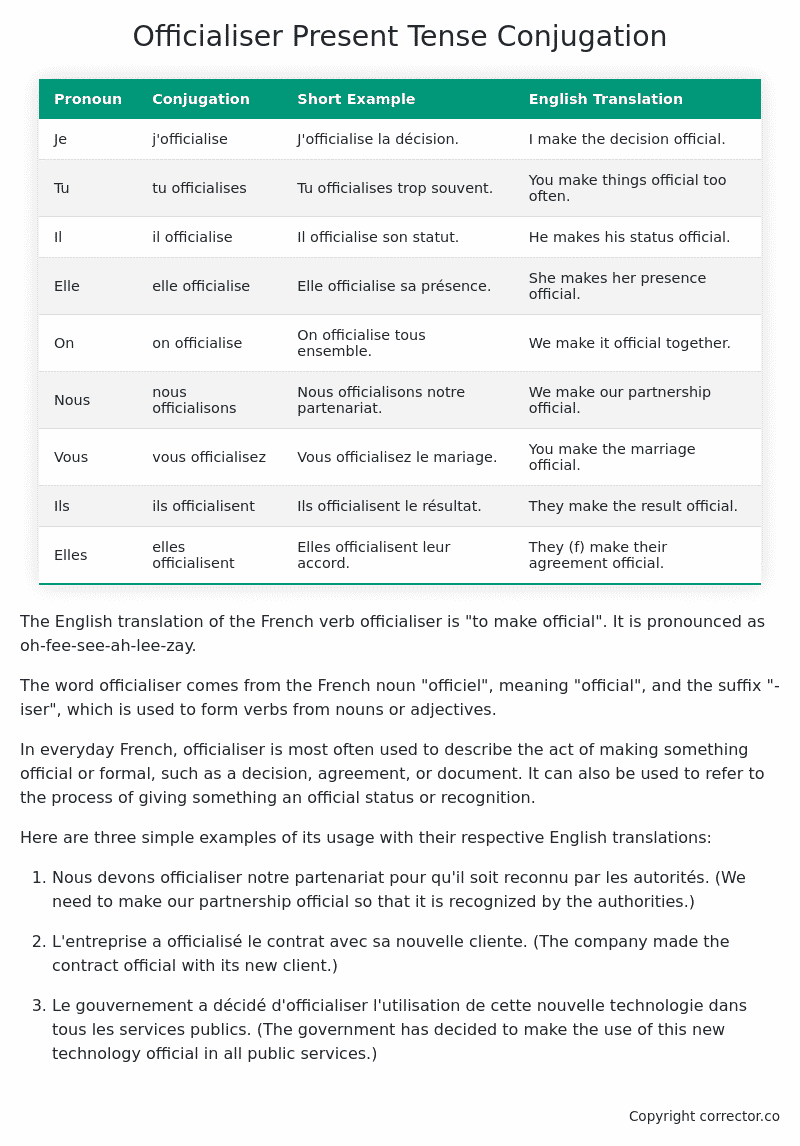Le Present (Present Tense) Conjugation of the French Verb officialiser
Introduction to the verb officialiser
The English translation of the French verb officialiser is “to make official”. It is pronounced as oh-fee-see-ah-lee-zay.
The word officialiser comes from the French noun “officiel”, meaning “official”, and the suffix “-iser”, which is used to form verbs from nouns or adjectives.
In everyday French, officialiser is most often used to describe the act of making something official or formal, such as a decision, agreement, or document. It can also be used to refer to the process of giving something an official status or recognition.
Here are three simple examples of its usage with their respective English translations:
-
Nous devons officialiser notre partenariat pour qu’il soit reconnu par les autorités. (We need to make our partnership official so that it is recognized by the authorities.)
-
L’entreprise a officialisé le contrat avec sa nouvelle cliente. (The company made the contract official with its new client.)
-
Le gouvernement a décidé d’officialiser l’utilisation de cette nouvelle technologie dans tous les services publics. (The government has decided to make the use of this new technology official in all public services.)
Officialiser – About the French Present Tense
To take a deep dive into all the French tenses then see our article on Mastering French Tense Conjugation.
Common Everyday Usage Patterns For Le Present
Interactions with Other Tenses
Table of the Present Tense Conjugation of officialiser
| Pronoun | Conjugation | Short Example | English Translation |
|---|---|---|---|
| Je | j’officialise | J’officialise la décision. | I make the decision official. |
| Tu | tu officialises | Tu officialises trop souvent. | You make things official too often. |
| Il | il officialise | Il officialise son statut. | He makes his status official. |
| Elle | elle officialise | Elle officialise sa présence. | She makes her presence official. |
| On | on officialise | On officialise tous ensemble. | We make it official together. |
| Nous | nous officialisons | Nous officialisons notre partenariat. | We make our partnership official. |
| Vous | vous officialisez | Vous officialisez le mariage. | You make the marriage official. |
| Ils | ils officialisent | Ils officialisent le résultat. | They make the result official. |
| Elles | elles officialisent | Elles officialisent leur accord. | They (f) make their agreement official. |
Other Conjugations for Officialiser.
Le Present (Present Tense) Conjugation of the French Verb officialiser (this article)
Imparfait (Imperfect) Tense Conjugation of the French Verb officialiser
Passé Simple (Simple Past) Tense Conjugation of the French Verb officialiser
Passé Composé (Present Perfect) Tense Conjugation of the French Verb officialiser
Futur Simple (Simple Future) Tense Conjugation of the French Verb officialiser
Futur Proche (Near Future) Tense Conjugation of the French Verb officialiser
Plus-que-parfait (Pluperfect) Tense Conjugation of the French Verb officialiser
Passé Antérieur (Past Anterior) Tense Conjugation of the French Verb officialiser
Futur Antérieur (Future Anterior) Tense Conjugation of the French Verb officialiser
Subjonctif Présent (Subjunctive Present) Tense Conjugation of the French Verb officialiser
Subjonctif Passé (Subjunctive Past) Tense Conjugation of the French Verb officialiser
Subjonctif Imparfait (Subjunctive Imperfect) Tense Conjugation of the French Verb officialiser
Conditionnel Présent (Conditional Present) Tense Conjugation of the French Verb officialiser
Conditionnel Passé (Conditional Past) Tense Conjugation of the French Verb officialiser
L’impératif Présent (Imperative Present) Tense Conjugation of the French Verb officialiser
L’infinitif Présent (Infinitive Present) Tense Conjugation of the French Verb officialiser
Struggling with French verbs or the language in general? Why not use our free French Grammar Checker – no registration required!
Get a FREE Download Study Sheet of this Conjugation 🔥
Simply right click the image below, click “save image” and get your free reference for the officialiser Present Tense tense conjugation!

I hope you enjoyed this article on the verb officialiser. Still in a learning mood? Check out another TOTALLY random French verb present conjugation!


